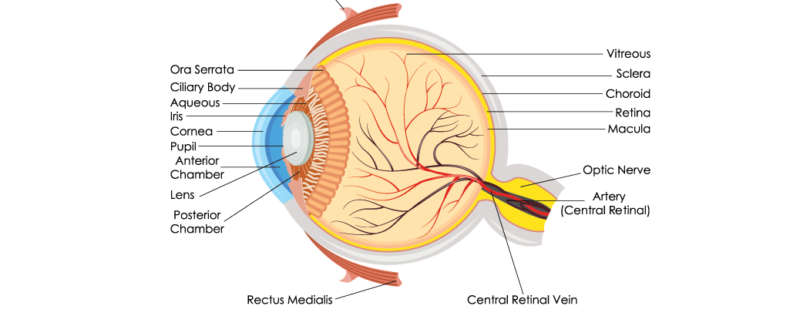The eyes are extremely complex yet fascinating. They weigh only a quarter of an ounce but require about half of the brain’s energy in order to function properly. Eyes can be green, blue, gray, brown or hazel; in fact, some people are born with two different colored eyes. Even so, eye color has no bearing on how well the eyes function; this is determined by nutrition, genes, age and how well a person cares for his or her eyes.
How Sight Works
The human eye works in much the same way as a camera, although it is infinitely more complicated than any machine man has ever made.
In order for a person to see what is going around him or her, light must enter the eye, pass through the cornea and head over to the lens. The lens’ primary job is to project the light onto the retina, the part of the eye that sends the light signal to the brain. The lens also helps a person to focus on objects that are either close-up or far away. When a person is either near sighted or far-sighted, this is an indication that the lens is not able to do its job properly; hence, a visit is in order to the eye specialist Houston patients can trust most, Dr. Goosey.
The pupil and iris also help the lens do its job. These two parts of the eye determine how much light is allowed to pass through to the lens. When there is plenty of light, the pupil and iris restrict the flow of light somewhat; if it is very dark outside, more light is permitted to pass through than would have been allowed otherwise.
Once the light image passes from the lens to the retina, the retina transfers these light signals to the brain via the optic nerve. The brain then translates these light signals into the images that we see day in and day out.
Eye Care
Surgery such as cataract removal and corneal transplants have allowed some blind people to be able to regain their eyesight. Unfortunately, other types of eye problems cannot be fixed. The optic nerve is so complex and sensitive that it cannot be reconstructed.
Thankfully, there are many ways in which a person can avoid eye problems. In fact, it has been estimated that up to 80% of all vision problems can be avoided with proper eye care. A person will want to protect his or her eyes from damage by using safety glasses when warranted and not attempting to read in a room without sufficient light. Proper nutrition is also in order, as the eyes need plenty of Vitamin A and other vitamins and minerals in order to function properly.
Scheduling regular visits with an eye doctor is also a must, especially for those who have a genetic predisposition to certain eye conditions. A good eye doctor can catch and treat eye problems early on or else refer a person to the best eye specialist Houston has who can provide specialized care when warranted. Dr. John Goosey has extensive experience with the eye and treats many eye conditions, restoring good vision to countless patients in the Houston area. Contact our offices today to schedule an appointment!





